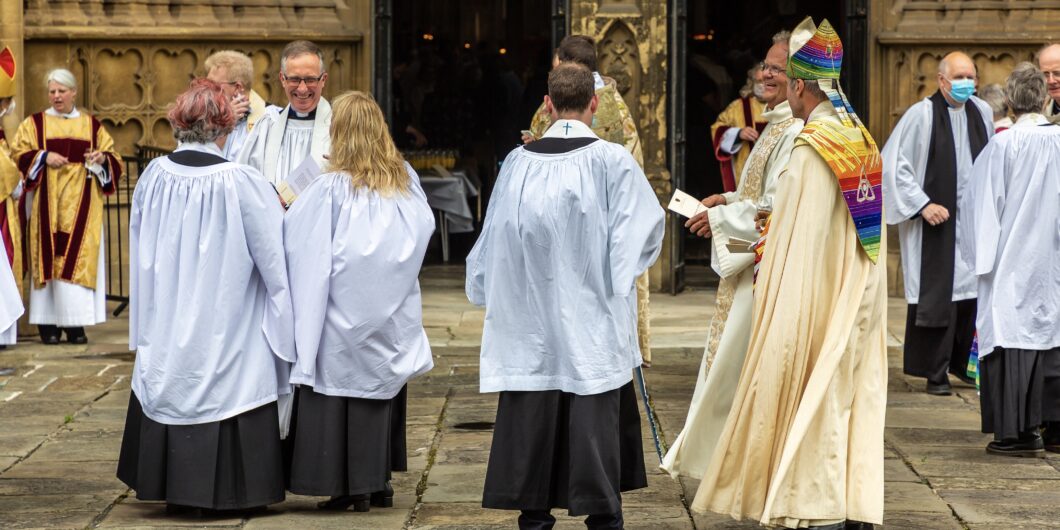Lifting the presumption of innocence leaves each of us on a knife’s edge, as it has Judge Kavanaugh.
Discombobulated Establishmentarianism
Does conservatism need to be religious? The Sharon statement, drawn up for Young Americans for Freedom in 1960 at William F. Buckley Jr.’s home, decided this question in the affirmative. It related liberty to our “God-given free will,” “transcendent values,” and “eternal truths.” The Sharon Statement recognized the connection between economic and political liberty and identified global communism as the greatest threat to both, in the United States and the world. Tradition-minded conservatives and libertarians both embraced the statement and thus the clear parameters for the so-called Cold War “fusion” were born. Fusionism continued to define the American conservative movement up through the dissolution of the Soviet Union in 1991. This fusion has since become frayed and, some argue, broken altogether.
The Freedom Conservatism Statement of Principles is an attempt to revive and reinvigorate the Fusionist project but makes no mention of the transcendent, the eternal, or God. The explanation for this comes in two parts. First, while most of the signatories are Christians of some sort, they disagree in matters of faith, and therefore “chose to focus instead on public policies affecting people of faith.” The second part of this rationale was voiced by Mark Tooley, who says that despite not mentioning God or religion, “the statement implicitly assumes a largely biblical perspective about human dignity, the limits of government, private property, equality before the law, the primacy of conscience, protection for families, and statecraft premised on providential realism.”
Sebastian Morello in his new book Conservatism and Grace: The Conservative Case for Religion by Establishment takes the opposite tack, insisting that the role of religion in conservatism is integral and ought to be explicit. For most of Conservatism and Grace, Morello focuses on the interplay between religion and conservatism as these were considered by Edmund Burke, Joseph de Maistre, and Morello’s mentor, Roger Scruton.
Morello defines “conservatism” as “the general political, intellectual, cultural, and moral attitude” that arose among those opposed to the more secular strains of the Enlightenment. Like Russell Kirk, whom he quotes often, Morello is clear that conservatism is not contained in an ideological list of policy prescriptions or in one’s party affiliation but rather in broad principles and an inclination to preserve the “permanent things” through right reason and the application of the virtues. If recourse to a culture’s religion is necessary to conserve the best of that same culture and make life worth living, then what might the implications be for liberty, order, law, and political economy, especially in the lands once known as Christendom?
This question leads Morello to explore a “conservative case for religion by establishment,” for if conservatism is inherently religious, then does being a conservative require politically established religion? Conversely, is a secular conservatism, particularly in Anglo-American culture, even possible?
Roger Scruton thought a secular conservatism was possible and, post-Enlightenment, preferable. He found no contradiction between this and his view of the human person as homo religiosus. Morello demonstrates that Scruton saw religion as important for instrumental reasons related to the conservative aims of national stability and social flourishing. Religious freedom can destabilize nations, as can religious diversity, and so according to Scruton “religion is not primarily about doctrine but membership in a community.” The effect of this view, Morello rightly argues, is that in Scruton’s conservatism, national loyalty, defense of the past (which is indelibly bound up with religion), and healthy patriotism all trump religious truth. In Scruton’s assessment, “the true enemy of conservatism is not the secularising component of liberalism, but liberalism’s globalist component.” With no intrinsic connection between religion and conservatism in Scruton’s thought, conservatism is reduced to defending established religion because in its public ceremonial function, it delays globalism by “encouraging national loyalty.”
Europe contains 22% of the world’s Christians. How would establishment work elsewhere, particularly in very religiously divided countries where the Christian faith is beloved and culturally important but relatively new, such as Nigeria?
While Scruton’s importance to Morello is to demonstrate that man’s religious nature means that any conservatism must be religious, Edmund Burke’s place in Morello’s argument is to show Church and State in a symbiotic relationship guided by divine providence. The “supernatural life of the Church” was necessary in order to infuse European culture with those mores most recognizable as foundational to European Christian culture. Morello argues that Burke “did not believe that a polity could be secular any more than he believed human nature could be secular.” Morello agrees with Burke that because we human beings are religious persons by our nature, it is impossible to have a polity without religion. Something, the State or perhaps ourselves, will be worshiped in place of God. Both the State and the Church are needed for human flourishing, according to Burke, and “by Church establishment, the State is consecrated and rendered holy.”
Whether Burke meant anything beyond the recognition that church and state are “two distinct principles of one single society ordered towards attaining the end of redeemed human nature” is less clear than Morello seems to think it is. The classic formulation of religion’s proper relationship to the State is to be found in Jesus’ injunction in Matthew 22:21: “Render to Caesar the things that are Caesar’s, and to God the things that are God’s.” Church and state working together (or, rather, in tension and conflict more often than not) over centuries to build up a common culture is not the same as establishment in the post-Reformation sense of confessional States. Any conservative ought to be wary of reconsecrating the state, for desacralizing the divinized state was one of the great accomplishments of Christianity in its early centuries.
Morello argues that Burke saw evidence for establishment in “the interior transformation” of Europe, and therefore of Europeans, wrought by Christian faith. Barbarians and violent, slave-owning Romans became Christians over the slow course of 1,000 years of organic cultural evolution, culminating in Christendom. It was the fusion of the Greco-Roman, the barbarian, and the Christian that made Europe, Europe. Burke is correct that this demonstrates the validity of his argument that culture, rooted in its original cultus, develops organically and in irreducibly complex ways. This is the theme of several books by Christopher Dawson, who also argues that Christendom has been disintegrating since its cultural apex in the thirteenth century.
This history presents a better argument for how personal conversion under grace unavoidably shapes culture, however, than it does for an established, legally privileged Church. Indeed, as Dawson demonstrates in Religion and the Rise of Western Civilization, it ultimately was the Christian liturgy and embodied worship at the foot of the altar, not kings, that perpetuated the faith, preserved culture, and created European Christendom. Pope John Paul II, in Centesimus Annus, expressed the Church’s relationship to the State and to particular governmental forms this way:
The Church … is not entitled to express preferences for this or that institutional or constitutional solution. Her contribution to the political order is precisely her vision of the dignity of the person revealed in all its fullness in the mystery of the Incarnate Word.
The establishmentarianism of Morello’s third philosopher—Joseph de Maistre—is even more pronounced, which is perhaps not unsurprising for one writing in the wake of the bloody, culture-destroying French Revolution. Maistre’s concern for national identity and limiting violence led him in the name of order to argue against religious liberty. To Maistre, “national character is the particularization of the universal law of human nature.” Consequently, a constitution has a providential aspect to it, being “bound up with the natural religious principle it has come to transform.” Therefore, there could be no neutral public square. To have such implies that the State, and not the Church, is the ultimate source of civil society, “and therefore may reconstitute civil society at will.” Certainly, the Jacobins in France had tried to do just that, to disastrous results both short and long term. Only grace can enable the State to become a sort of “temporal aspect of the Church.” The upshot of Maistre’s conception is that the sovereign has only one superior, the pope.
“Christianity, then, is a political project,” for Maistre, but one that requires a Catholic polity to bring true liberty to enslaved humanity. How, then, would establishment work in pluralistic modern Europe? Moreover, which church ought to be established in historically Christian countries without the long history of a single church, such as the United States? And in those countries with established churches, shall we ask how religion and churchgoing have fared? This last is important, if Dawson is right about the transformational power of liturgy and Burke, et al., are right about community, which assumes the corporate nature of the Christian faith. As it turns out, establishment would be unworkable even if it was the dogmatic preference.
Applying briefly an empirical study of Sunday attendance and affiliation to the nations of northern Europe or to parishes in the Church of England does not reveal good news for establishment. Questioning the correlation of establishment to non-attendance/non-belief, and religious liberty to attendance/belief, produces data that ought to give one pause when one lives in a country with an established church that so few attend or take seriously as a moral force, and where desperation for relevance can lead to events like the recent “Rave in the Nave” at Canterbury Cathedral, an event criticized by the European Conservative, of which Morello is senior editor.
Europe contains 22% of the world’s Christians. How would establishment work elsewhere, particularly in very religiously divided countries where the Christian faith is beloved and culturally important but relatively new, such as Nigeria? Other places have centuries-old, competing religions that go back further than the schisms of the Reformations era in Europe. Who gets to choose the preeminent religious tradition in, say, Egypt, Ethiopia, and India? To solve this dilemma, the Catholic Church, in Dignitatis Humanae, opts for prudence based on the deep principle of human dignity:
In order for relationships of peace and harmony to be established and maintained within the whole of mankind, it is necessary that religious freedom be everywhere provided with an effective constitutional guarantee and that respect be shown for the high duty and right of man freely to lead his religious life in society.
Then there are those lands with other established faiths, where Christians are forbidden to open seminaries, seek converts, and play a role in public life. Wouldn’t religious liberty be preferable, even if Christians somehow got the upper hand?
Establishmentarianism fails on practical grounds, chips away at human dignity, and downplays the truth that virtuous acts require freedom in order to be virtuous.
In outlining the connection between grace and religion on the one hand, and a teleological view of the human person as imago dei on the other, Morello makes a convincing case for religion’s indelible connection to culture and therefore to the conservative impulse to preserve the “permanent things.” Moreover, Morello is no neo-integralist but rather promotes “an integralism of love” that depends on grace, an alternative both to religious liberty and to neo-integralism. This is the approach he finds in the pages of Maistre and Burke.
It is unclear why we would even want to use the term, “establishment,” for such an arrangement as taking religion seriously when it comes to preserving the “permanent things” of Western civilization. Making a case for religion’s role in culture and conservatism is not the same as making a case for religion by establishment. Indeed, for most of the nineteenth century and all of the twentieth century, the greatest mystery about the United States for outside observers was that, despite having no national- or state-established churches, Americans attended church in large numbers and, without much controversy, effortlessly used religious language in their political discourse.
Religion does not equal establishment. Morello rightly focuses on anthropology, that is, on the nature of the human person. Indeed, this is also the focus of the Catholic Church, which notes in its Catechism that, “The right to the exercise of freedom, especially in moral and religious matters, is an inalienable requirement of the dignity of the human person.” That is to say, religious freedom is not only practical and prudent, it is required by “the very dignity of the human person,” to use the words of Dignitatis Humanae. And where the State’s role is concerned, it is again worth remembering the formulation that is even older than Dignitatis Humanae, found in Matthew 22:21.
Establishmentarianism fails on practical grounds, chips away at human dignity, and downplays the truth that virtuous acts require freedom in order to be virtuous. Religious liberty assists the development of virtue because moral choices must be free choices. The connection of freedom to virtue, and virtue to religion, is especially important to free societies and highlights the connection of religious liberty to political and economic liberty.
In his Farewell Address, George Washington boiled this down to identifying piety as the “necessary spring of popular government.” “Reason and experience,” he said, “both forbid us to expect that national morality can prevail in exclusion of religious principle.” He did not, however, identify “religious principle” with religious establishment. Thus, the most convincing part of Morello’s formulation where conservatism and religion are concerned confirms the wisdom William F. Buckley Jr. voiced decades ago: “A conservative need not be religious, but a conservative cannot despise religion.”



